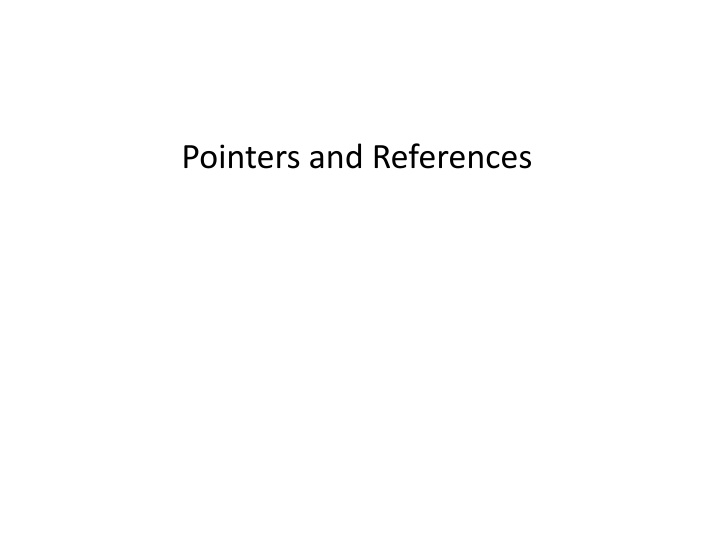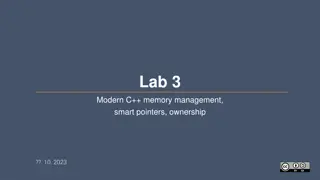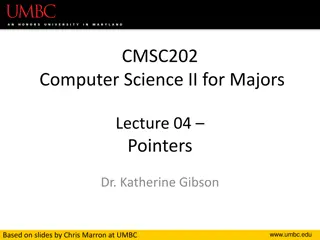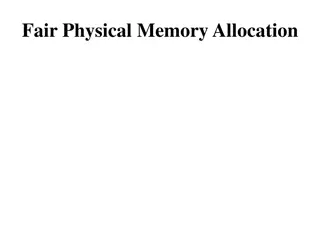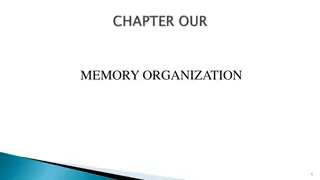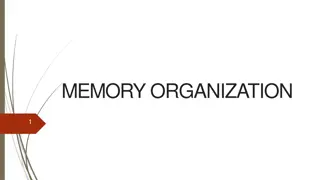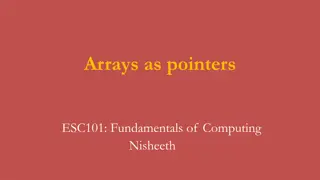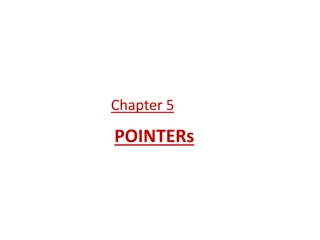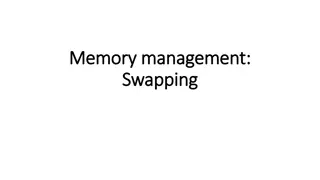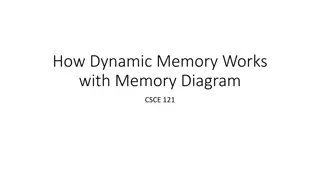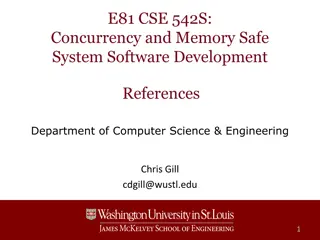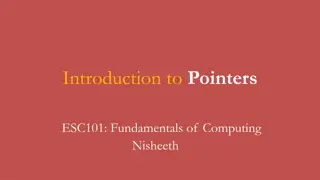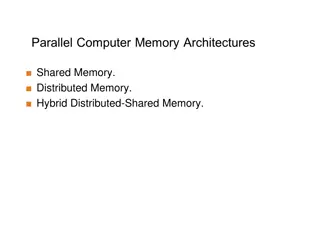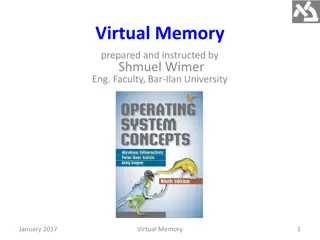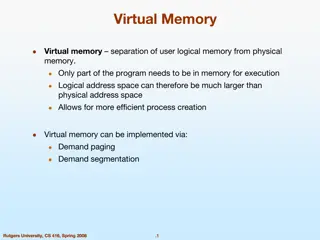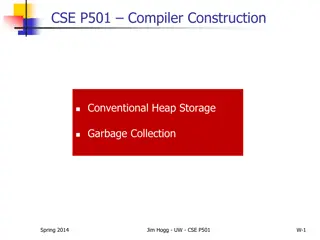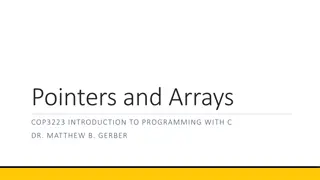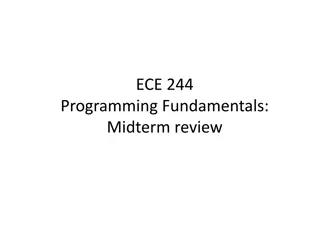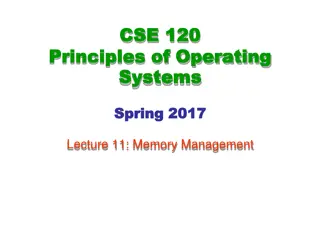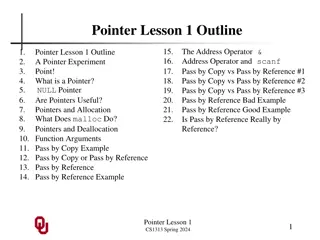Memory Management in C++: Pointers, References, and Destructors
Exploring memory management concepts in C++, including pointers, references, allocating and deallocating memory using new and delete, handling arrays, and understanding the role of destructors in managing memory resources effectively.
Download Presentation

Please find below an Image/Link to download the presentation.
The content on the website is provided AS IS for your information and personal use only. It may not be sold, licensed, or shared on other websites without obtaining consent from the author.If you encounter any issues during the download, it is possible that the publisher has removed the file from their server.
You are allowed to download the files provided on this website for personal or commercial use, subject to the condition that they are used lawfully. All files are the property of their respective owners.
The content on the website is provided AS IS for your information and personal use only. It may not be sold, licensed, or shared on other websites without obtaining consent from the author.
E N D
Presentation Transcript
Pointers & Memory 0x00 0x04 0x08 0x0B 0x10 0x14 0x18 0x1B 0x20
Pointers & Memory int x = 5; 0x00 0x04 0x08 0x0B 0x10 0x14 0x18 0x1B 0x20 5 x
Pointers & Memory int x = 5; int* y = &x 0x00 0x04 0x08 0x0B 0x10 0x14 0x18 0x1B 0x20 5 x 0x04 y
Pointers & Memory int x = 5; int* y = &x int* z = y; 0x00 0x04 0x08 0x0B 0x10 0x14 0x18 0x1B 0x20 5 x 0x04 0x04 y z
Pointers & Memory int x = 5; int* y = &x int* z = y; *z = 0; 0x00 0x04 0x08 0x0B 0x10 0x14 0x18 0x1B 0x20 0 x 0x04 0x04 y z
Allocating memory using new Point *p = new Point(5, 5); new can be thought of a function with slightly strange syntax new allocates space to hold the object. newcalls the object s constructor. new returns a pointer to that object.
Deallocating memory using delete // allocate memory Point *p = new Point(5, 5); ... // free the memory delete p; For every call to new, there must be exactly one call to delete.
Using new with arrays int x = 10; int* nums1 = new int[10]; // ok int* nums2 = new int[x]; // ok Initializes an array of 10 integers on the heap. C++ equivalent of the following C code int* nums = (int*)malloc(x * sizeof(int));
Using delete on arrays // allocate memory int* nums1 = new int[10]; int* nums3 = new int[x][4][5]; ... // free the memory delete[] nums1; delete[] nums3; Have to use delete[].
Destructors deletecalls the object s destructor. delete frees space occupied by the object. A destructor cleans up after the object. Releases resources such as memory.
Destructors an Example class Segment { public: Segment(); virtual ~Segment(); private: Point *m_p0, *m_p1; };
Destructors an Example Segment::Segment() { m_p0 = new Point(0, 0); m_p1 = new Point(1, 1); } Segment::~Segment() { if (m_p0) delete m_p0; if (m_p1) delete m_p1; }
Syntactic Sugar -> Point *p = new Point(5, 5); // Access a member function: (*p).move(10, 10); // Or more simply: p->move(10, 10);
Stack vs. Heap On the Heap / Dynamic allocation On the Stack / Automatic allocation Point *p = new Point(); Point p; Point *ps = new Point[n]; Point ps[10]; What happens when p goes out of scope?
Dynamic Memory 1 2 3 4 5 6 7 S
Dynamic Memory 1 2 3 4 5 6 7 S 0 0 0 0 0 0 0 0 0 0 0 0 0 0 T int* T = new int[2*n];
Dynamic Memory 1 2 3 4 5 6 7 S 1 2 3 4 5 6 7 0 0 0 0 0 0 0 T for (i = 0; i < n; i++) T[i] = S[i];
Dynamic Memory 1 2 3 4 5 6 7 S 1 2 3 4 5 6 7 0 0 0 0 0 0 0 T delete[] S;
Dynamic Memory S 1 2 3 4 5 6 7 0 0 0 0 0 0 0 T S = T;
Passing by value void Math::square(int i) { i = i*i; } int main() { int i = 5; Math::square(i); cout << i << endl; }
Passing by reference void Math::square(int &i) { i = i*i; } int main() { int i = 5; Math::square(i); cout << i << endl; }
What is a reference? An alias another name for an object. int x = 5; int &y = x; // y is a // reference to x y = 10;
Introducing: const void Math::printSquare(const int &i){ i = i*i; cout << i << endl; } Won t compile. int main() { int i = 5; Math::printSquare(i); Math::printCube(i); }
Can also pass pointers to const void Math::printSquare(const int *pi) { *pi = (*pi) * (*pi); cout << pi << endl; } Still won t compile. int main() { int i = 5; Math::printSquare(&i); Math::printCube(&i); }
Declaring things const const River nile; const River* nilePc; River* const nileCp; const River* const nileCpc
Read pointer declarations right to left // A const River const River nile; // A pointer to a const River const River* nilePc; // A const pointer to a River River* const nileCp; // A const pointer to a const River const River* const nileCpc
Exercises 1. Create a class called Point with two private data members, a public print function, and constructors as well as a destructor that prints a message when it is called. 2. Create an array of 10 Points on the stack, initialize them with non- zero data, and print them. Verify that that the destructor is called for all 10 points when your program exits. 3. Create an array of 10 Points on the heap, initialize them with non- zero data, and print them. Do not delete the array and verify the destructor is not called (you have created a memory leak). Now write your program to delete the array at the end. Verify that only one destructor is called and your program crashes (you have created a memory leak and a bug). Now write your program to delete[] the array at the end. Verify that all destructors are called.
